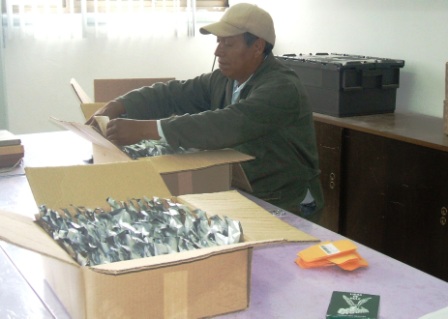Distribution of bread wheat, durum wheat, triticale and related cereals genetic resources
Contributors to this page: CIMMYT - Wheat, Mexico (Thomas Payne), ICARDA, Syria (Ahmed Amri) with inputs also received from CIMMYT - Maize, Mexico (Suketoshi Taba), USDA - National Small Grains Collection, Aberdeen, Idaho, USA (Harold Bockelmann), CGN, Wageningen, The Netherlands (website) and IPK, Gatersleben, Germany (Helmut Knűpffer).
|
Contents: |
Policies and regulations for distribution
Common policies on distribution and access to plant material
- Free or low cost distribution of germplasm, in response to documented requests received by letter, email or via internet shopping carts.
- Verbal requests for germplasm should not be accepted.
- A Material Transfer Agreement (MTA) should accompany every germplasm shipment. The Standard Material Transfer Agreement (SMTA) should be used when appropriate.
National laws and regulations
It is essential to follow regulations imposed by local host country laws and agreements, including for each shipment provision of a:
- Phytosanitary certificate.
- Letter of donation (with 'no’ or low commercial value stated).
- Certificate of origin.
- GMO-free certificate, when required.
- Import Permit.
Customer satisfaction and user related issues
Tracking of shipment
- Provision of courier specific tracking numbers should be sent to each shipment recipient.
- Tracking of the shipment en route to the recipient should be closely monitored by the sending organization to ensure safe and timely delivery of the germplasm shipment.
Customer assurance
ICARDA recommends the following procedures:
- All germplasm requests should be checked and validated by the crop curator.
- When the customer requests specific germplasm referencing identification numbers – the original request should be transferred to the curator who checks availability before passing a genebank distribution request to the genebank manager – the list of accessions provided by the curator should be checked against the distribution list. When the customer requests accessions with specific traits the curator should refer to available characterization and evaluation data to make the appropriate selections.
- When no data is available, random samples should be extracted or core collection subsets should be sent to the customer.
- When the customer approaches the genebank with a request for unreferenced material, it is essential that the customer and the curator discuss the request to clarify what specific types of germplasm (including needed traits or adaptation) are desired or required.
- Once the germplasm requirements are established, the curator can use all the information at their disposal to tailor a set of material that has the best probability of containing the sought after traits, in a subset size that suits the client. This approach will increase the probability that the subset of material sent will contain the sought after genes or traits while keeping the number of samples sent consummate with the resources that are available.
- For adaptive traits being sought in landrace material and/or wild progenitors, a Focused Identification of Germplasm Strategy (FIGS) may be used whereby geo-referenced accessions are coupled with GIS information about the environments in which they were grown or evolved.
Feedback from users
- Recipients should acknowledge the receipt of germplasm shipments and comment on any problems encountered during the selection, ordering or shipment procedures.
- Recipients should be requested to return characterization, evaluation and other non-confidential observations made on the material provided.
Recommended quantity of seed to be distributed
Small quantities of seed should be distributed to reduce the necessity to regenerate accessions too frequently.
- Cultivated cereals: 10 g.
- Wild cereal species: 50 seeds.
- Cytogenetic stocks: 1 g.
Routine procedures for distribution
Checking availability
- Verify the validity of the request by the curator.
- Register the request by assigning unique order request numbers.
- Check the availability of the requested seeds stocks.
- Prepare the MTA or SMTA and associated passport, characterization or evaluation data.
- Dispatch the material.
Preparing the samples for distribution

Preparing samples for distribution (photo: CIMMYT) |
- Prepare a list of accessions available for the order.
- Check any IP requirements for the material’s legal transfer.
- Generate packet labels and label the seed packets. Assure accuracy in the identification of the seed packets.
- Check inventory files and locate the source seed containers in the genebank.
- Remove the needed seed containers from the genebank.
- Extract the required seed samples from the containers.
- Update the genebank seed weight inventory after removing the required amount(s) of seed to fulfill the order(s).
Recorded information per shipment
- Reference number.
- Recipient’s name.
- Name and address of the recipient organization.
- User information (type of organization requesting materials).
- Date of request.
- Date of shipment.
- Number and quantity of samples provided.
- Shipment packing list of material provided.
- SMTA reference number.
- Intended use of the material provided.
- Other remarks.
A computer system to track material dispatched, and to maintain accurate inventories is an advantage for more efficient genebank management.
Comments
- No comments found





Leave your comments
Post comment as a guest